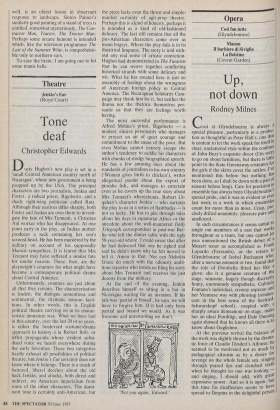Opera
Cosi fan tutte (Glyndebourne)
Manon II barbiere di Siviglia La Boheme (Covent Garden)
Up, not down
Rodney Milnes
Cosi at Glyndebourne is always a special pleasure, particularly in a produc- tion as thoughtful as Peter Hall's, one that is content to let the work speak for itself in clear, uncluttered style within the confines of John Bury's exquisite decor (I'm sorry to go on about hemlines, but there is little point to the Kate Greenaway costumes for the girls if the skirts cover the ankles; I've mentioned this before but nothing has been done, so I shall be down with a pair?', scissors before long). Care for precision in, ensemble has always been Glyndebourne 's special pride, and it was as evident as ever last week in a work in which ensembles count for more than in most. Crisp, Pre- cisely drilled unanimity: pleasure pure and unalloyed. In such circumstances it seems unfair to single out members of a cast that works throughout as a team, but one cannot let pass unmentioned the British debut of a Mozart tenor as accomplished as Frank Lopardo (Ferrando), or the return to Glyndebourne of Isobel Buchanan who, after a nervous moment or two, found that the role of Dorabella fitted her like a glove: she is a gemiine creature of the stage, winsome, hugely though discreedY funny, enormously sympathetic. Gabriele Fontana's individual, creamy soprano and her Viennese way with phrasing (reminta- cent in the best sense of the Seefrierl- Schwarzkopf school), coupled with a sharply aware demeanour on stage, make her an ideal Fiordiligi, and Dale Duesing again showed that he knows all there is to know about Guglielmo. At the previous revival the balance of the work was slightly thrown by the drama- tic force of Claudio Desderi's Alfonse: he seemed to be motivated not so much by pedagogical altruism as by a desire for revenge on the whole female sex, singing through pursed lips and clenched teeth when he thought no one was looking -- and singing, I should add, with great expressive power. And so it is again, but this time his disaffection seems to have spread to Despina in the delightful person of Lillian Watson: the earthy peasant wisdom of the character was overlaid with an aura of malicious impatience as she shot a series of Margaret Lockwood-style dirty looks at her naive mistresses and the world in general. 'I'm an old slag,' she seemed to be saying, 'and I'm jolly well going to drag you down to my own level.' I don't think this is what Cosi is about. As in the case of Elinor Glyn's lightning (and temporary) conversion to socialism while driving through the slums of Waterloo, enlighten- ment is a matter of dragging people up, not down.
Why do reactions to Cosi have to be so personal? (Attentive readers could write my biography from 17 years of notices in these pages.) My personal reaction to the conductor of this revival, Lother Zagrosek, might not have been too flattering after the first act, which contained a little too much arch phrasing, as if to imply, 'Aren't I clever to have thought of that?' To which the answer is, 'No, stop messing about and get on with beating two in a bar,' which is more or less what he proceeded to do in the second act, save when the music was in triple time. Judgment suspended. The less said about the Royal Opera's new Manon the better. Rather pass by, crossing oneself nervously. Misconceived and mis-executed, it made poor Massenet's opera seem very boring indeed. We all m. ake mistakes. Their revival of the Barber Is quite another matter, buoyantly con- ducted by the leading Rossini specialist of the day, Gabriele Ferro, and graced by a performance of infinite style and good humour from Lucia Valentini Terrani (Rosina). Her coloratura is not only accu- rate, but musical and funny as well, and she uses her pleasingly plump appearance (grassotto indeed) to maximum comic effect, sashaying about the stage like a hunt/fling...top on speed. I loved every moment. In the title role Leo Nucci looked a little more pleased with himself than he had reason to (a lazy, coasting perform- ance), but Deon van der Walt's neat Almaviva and Paata Burchuladze's caver- nous Basilio gave much pleasure. The big news from Bow Street was the first live transmission of a performance in the opera house — La Boheme with Ilona Tokody, Placido Domingo and Thomas Allen on to something called the Big Screen in the Piazza. I can't pretend to understand the technical side, but clear Images appear on a copper-coloured thing unpromisingly made up of lots of little squares. Obviously there were teething troubles, mainly to do with the level of light on stage, but the sound was excellent i and in the circumstances (i.e. no rehearsal) Humphrey Burton's camera direction was a staggering achievement. Over 2,000 pun- ters watched the performance free of charge in traditional English drizzle and seemed to love it, raising the non-existent roof when the stars came out to take a non-existent curtain call. Why should it have been so much more exciting than a live television transmission? Simply be- cause opera is a communal art form, and an audience of 2,000 is better than an audience of one. More, please.



























































 Previous page
Previous page